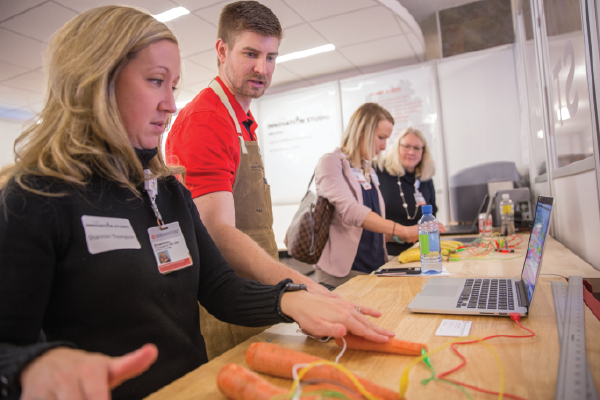Master of Healthcare Innovation Program Empowers Students to Become Leaders of Change

“Innovation” is the latest buzzword in an era marked by cutting-edge technology and rapid change. But what does it actually mean to be an innovator, and how can it be applied to a career in healthcare?
To Tim Raderstorf, clinical instructor of practice and chief innovation officer at The Ohio State University College of Nursing, an innovator is someone who introduces positive change in their industry.
“Whatever system they work in, whether that be a McDonald’s, a health system or anywhere else across the board, innovation is all about creating new value,” he said.
The Master of Healthcare Innovation (MHI) program at Ohio State is shaping leaders of change in all areas of the industry. Healthcare innovation is not just about creating a new device or widget, but about applying the process of design to change an aspect of the industry. With classes on innovative leadership and healthcare policy, this 100 percent online degree program prepares students for roles in administration, healthcare technologies and patient care with the ability to affect change in today’s complex healthcare systems.
The program is truly for anyone with a passion for transforming healthcare. Although there are typical career trajectories that occur in the industry, the MHI program is designed to be applicable to any related role in the healthcare system; current students range from nurses to marketing leaders.
Across roles in the industry, the MHI program inspires new ways of thinking about healthcare and leadership both through unique coursework and hands-on, collaborative projects. Raderstorf explained that the capstone course is what sets this online program apart from others. Currently, students have a semester to complete a project that requires getting buy-in from other students to join their teams – almost like getting an organization to approve of a new idea.
“Most health sciences focus on the science and theory behind the work you do at the bedside, but the majority of our students come with that baseline already,” Raderstorf said. "MHI focuses on the science and theory behind innovation, and then we actually allow them to put that into practice,”
Through the capstone, students gain meaningful experience applying innovative solutions to real-world healthcare problems. These projects can be valuable additions to student portfolios and CVs. Previous student projects have included new staffing models, a better pre-op system to evaluate incoming patients, implementing resiliency and meditation rooms for professionals, and even removing management to allow a team to manage themselves. With an MHI degree, anyone can be a leader and re-envision norms.
“We are learning how the healthcare system works and how it all connects. From clinical to administrative, I am learning how to change the healthcare industry for the benefit of the patient,” said student Emily Caudill.
Another outlet for online students to gain experience and mentorship is through the Innovation Studio. As the CIO, Raderstorf runs this moveable makerspace through various locations at the Columbus campus. Housing an array of prototyping tools, the studio allows students to explore their ideas for healthcare solutions outside of class.
No matter what idea a student has, the MHI program provides the resources necessary to see that vision through, in any position within the healthcare industry.
Interested in leading a revolution in healthcare? Visit the Master of Healthcare Innovation program page to learn more and apply today.
